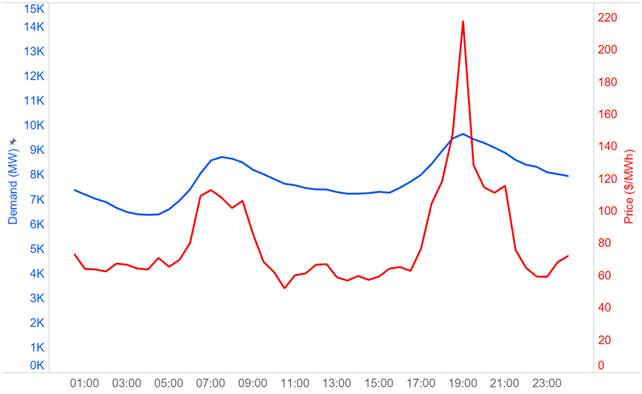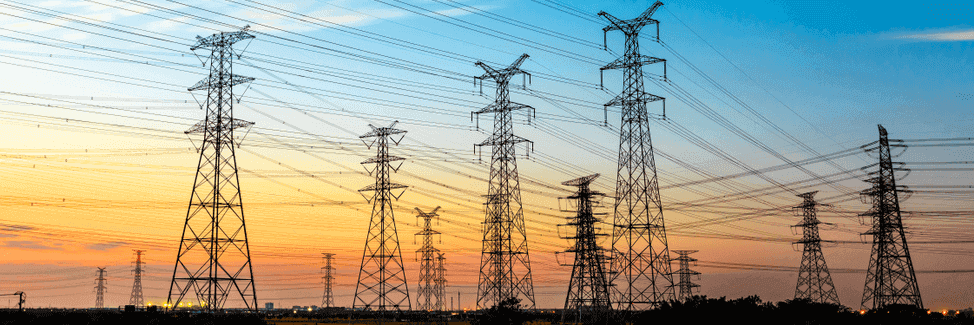KEY POINTS
- Wholesale electricity prices are what electricity providers pay for electricity.
- Only two suppliers provide wholesale energy prices – Amber Electric and Energy Locals.
- Customers are given access to wholesale electricity rates with a membership fee, which can be paid via instalments or an annual sum.
In this article, Canstar Blue explains what wholesale electricity prices are and which energy providers offer it.
Understanding wholesale electricity prices could give you the ability to save money on your electricity bills by taking control over some of the energy market’s lowest usage rates.
On this page:
What are wholesale electricity prices?
An electricity provider will buy wholesale market electricity from the National Electricity Market (NEM) and then on-sell the wholesale rates to customers at a marked-up price. The marked-up electricity price covers the cost of generating and transporting energy to households via poles and wires, plus any government schemes and residual retailer expenses. Finally, the energy provider will incorporate its profit into the final cost.
It’s important to note that electricity purchased at a wholesale rate is called a spot market, meaning prices are traded regularly between energy generators and energy retailers. Spot prices are updated every 30 minutes and fluctuate in value depending on the time of day.
Here is an example from the Australian Energy Market Commission (AEMC) of how much wholesale electricity prices can vary during peak demand periods (i.e. when people get home and turn on their appliances).

Image source: aemc.gov.au
The graph above highlights a spike in electricity demand from around 4pm to 7pm on a weekday, a three-hour period when the electricity grid is usually at its peak capacity. Electricity demand increases and decreases throughout the day, as do spot prices.
How do wholesale electricity plans work?
While a handful of electricity retailers claim to give customers access to wholesale electricity prices, there are typically other costs attached, such as membership fees. This means that although wholesale electricity rates are technically on offer, consumers will still be paying more for the spot price as listed by the Australian Energy Market Operator (AEMO).
In reality, customers are given access to wholesale electricity rates at the expense of a membership fee, which can be paid via ongoing instalments or a lump annual sum. Although wholesale electricity rates are available, it will generally come at a cost somewhere else, so always be sure to familiarise yourself with the energy provider’s terms and conditions.
Some wholesale electricity providers offer ways to help consumers save on wholesale electricity prices when they’re at their cheapest. This includes alerts through smartphone apps which display live rates and pricing forecasts.
Aside from energy retailers themselves, only large-scale industrial businesses can buy wholesale electricity prices directly from energy generators as their electricity demand is much higher than residential or small business customers. If customers are going to benefit from cheap wholesale electricity prices, the adverse side is that these fluid changes will also affect energy bills when the wholesale cost increases.
Which providers sell wholesale electricity prices?
There are more than 30 residential energy retailers in Australia, but only two provide wholesale energy prices – Amber Electric and Energy Locals.
Amber Electric
One of the most popular wholesale electricity providers in Australia is Amber Electric. In exchange for providing wholesale electricity prices, this energy provider charges a small monthly fee. Amber Electric also has an app which gives consumers live prices and 12-hour forecasts.
Since mid-2021, Amber Electric and CommBank Australia have worked in partnership to provide wider access to greener energy. CommBank customers who sign up to Amber can receive a welcome credit once a CBA credit card, debit card or bank account is linked to the Amber payment method.
Here are Amber’s plans on our database for NSW. These are products from a referral partner†. These costs are based on the Ausgrid network in Sydney but prices may vary depending on your circumstances. This comparison assumes general energy usage of 3900kWh/year for a residential customer on a single rate tariff. Please use our comparison tool for a specific comparison in your area. Our database may not cover all deals in your area. As always, check all details of any plan directly with the retailer before making a purchase decision.
Here are Amber’s plans on our database for VIC. These are products from a referral partner†. These costs are based on the Citipower energy network in Melbourne but prices may vary depending on your circumstances. This comparison assumes general energy usage of 4000kWh/year for a residential customer on a single rate tariff. Please use our comparison tool for a specific comparison in your area. Our database may not cover all deals in your area. As always, check all details of any plan directly with the retailer before making a purchase decision.
Here are the Amber’s plans on our database for SE QLD. These are products from a referral partner†. These costs are based on the Energex network in Brisbane but prices may vary depending on your circumstances. This comparison assumes general energy usage of 4600kWh/year for a residential customer on a single rate tariff. Please use our comparison tool for a specific comparison in your area. Our database may not cover all deals in your area. As always, check all details of any plan directly with the retailer before making a purchase decision.
Here are the Amber’s plans on our database for SA. These are products from a referral partner†. These costs are based on the SA Power network in Adelaide but prices may vary depending on your circumstances. This comparison assumes general energy usage of 4000kWh/year for a residential customer on a single rate tariff. Please use our comparison tool for a specific comparison in your area. Our database may not cover all deals in your area. As always, check all details of any plan directly with the retailer before making a purchase decision.
Energy Locals
Energy Locals is a smaller electricity retailer taking on the competition in New South Wales, Victoria, South East Queensland, South Australia, Tasmania and the ACT. It currently offers various plans. Online Member and Local Member both provide wholesale electricity prices in each of these states. Energy Locals has a third plan in VIC called Daytime Saver and another plan called Home Classic that is offered in NSW, SA and TAS.
Monthly membership fees apply and each deal may not be available in all areas. Energy Locals promises ‘no price gouging’ when rates change, as well as access to an online portal that shows half-hour electricity usage.
Here are the Energy Locals plans on our database for NSW. These are products from a referral partner†. These costs are based on the Ausgrid network in Sydney but prices may vary depending on your circumstances. This comparison assumes general energy usage of 3900kWh/year for a residential customer on a single rate tariff. Please use our comparison tool for a specific comparison in your area. Our database may not cover all deals in your area. As always, check all details of any plan directly with the retailer before making a purchase decision.
Here are the Energy Locals plans on our database for Victoria. These are products from a referral partner†. These costs are based on the Citipower network in Melbourne but prices may vary depending on your circumstances. This comparison assumes general energy usage of 4000kWh/year for a residential customer on a single rate tariff. Please use our comparison tool for a specific comparison in your area. Our database may not cover all deals in your area. As always, check all details of any plan directly with the retailer before making a purchase decision.
Here are the Energy Locals plans on our database for SE QLD. These are products from a referral partner†. These costs are based on the Energex network in Brisbane but prices may vary depending on your circumstances. This comparison assumes general energy usage of 4600kWh/year for a residential customer on a single rate tariff. Please use our comparison tool for a specific comparison in your area. Our database may not cover all deals in your area. As always, check all details of any plan directly with the retailer before making a purchase decision.
Here are the Energy Locals plans on our database for South Australia. These are products from a referral partner†. These costs are based on the SA Power Networks network in Adelaide but prices may vary depending on your circumstances. This comparison assumes general energy usage of 4000kWh/year for a residential customer on a single rate tariff. Please use our comparison tool for a specific comparison in your area. Our database may not cover all deals in your area. As always, check all details of any plan directly with the retailer before making a purchase decision.
Here is the cheapest published deal from Energy Locals currently on our database for Tasmania. This is a product from a referral partner†. These costs are based on a household with an annual electricity usage of 2,947kWh/year for a residential customer on a single rate tariff at a selected postcode in Tasmania, but prices will vary depending on your circumstances. Please use our comparison tool for a specific comparison in your area. Our database may not cover all deals in your area. As always, check all details of any plan directly with the retailer before making a purchase decision.
Treat wholesale electricity prices as estimates
Successfully purchasing cheaper wholesale energy rates means accurately predicting annual energy costs.
Australian energy regulations mean that energy retailers and comparison websites (including Canstar Blue and various government sites) must give consumers a price estimate and reflect how this cost compares to the market. This is why estimated costs for wholesale electricity plans should be treated with some caution.
It takes a cautious approach in only guaranteeing customers an annual cost equal to the reference price, when in reality households could stand to save much more in the right circumstances. It all comes down to how well customers engage in the process – and of course, what wholesale electricity prices do.
Are wholesale electricity prices cheaper?
Wholesale electricity prices are technically the cheapest on the energy market, but that doesn’t mean these rates remain the cheapest when sold to customers. As mentioned earlier, energy companies usually attach other fees to cover the cost of giving customers access to wholesale prices.
Given the fluctuating nature of the wholesale electricity market, those cheap rates can suddenly skyrocket at a moment’s notice should energy supply struggle to meet demand. The retailers that sell wholesale electricity prices claim to have measures in place to try to mitigate the risk of high spot prices being passed on to customers, but it’s worth keeping in mind the volatile nature of the system.
For a wholesale electricity plan to work well in your favour, you will need to monitor energy prices closely. It is also vital that you follow your energy retailer’s guidance on when electricity is affordable and when it’s time to cut back due to high spot prices. Given that the wholesale electricity retailer will be making money from membership fees rather than through energy usage (as with most normal energy plans), the energy retailer has nothing to gain from seeing customers hit with higher usage rates.
How much does 1kWh cost?
The price charged for electricity per kilowatt hour (kWh) will depend on the state, as well as the electricity distributor, which is responsible for delivering energy to homes and businesses via the national electricity grid. Unlike energy distributors, an energy retailer is in charge of setting the kWh price that customers pay for electricity.
Are wholesale electricity prices worth it?
Signing up to an energy retailer offering wholesale electricity prices with lower rates can pave the way to cheaper energy bills. If you can justify membership fees in exchange for wholesale electricity prices, then these plans could prove to minimise bill costs.
Just make sure you research sufficiently and understand what you are signing up for. Wholesale electricity plans are suitable for consumers who can closely monitor their energy usage in search of cheaper rates. Choosing a wholesale electricity plan certainly means energy costs are less predictable, but taking the risk could pay off.
A good place to start your research is by comparing usage and supply charges of energy plans. Wholesale electricity prices and information on other plans can be found by using Canstar Blue’s free comparison tool below.
Simply type in your postcode, select a plan of interest and click on the ‘more details’ button to the right of the page.
Original reporting by Jared Mullane
Image Source: ABCDstock/Shutterstock.com, Australian Energy Market Commission (AEMC)



Share this article